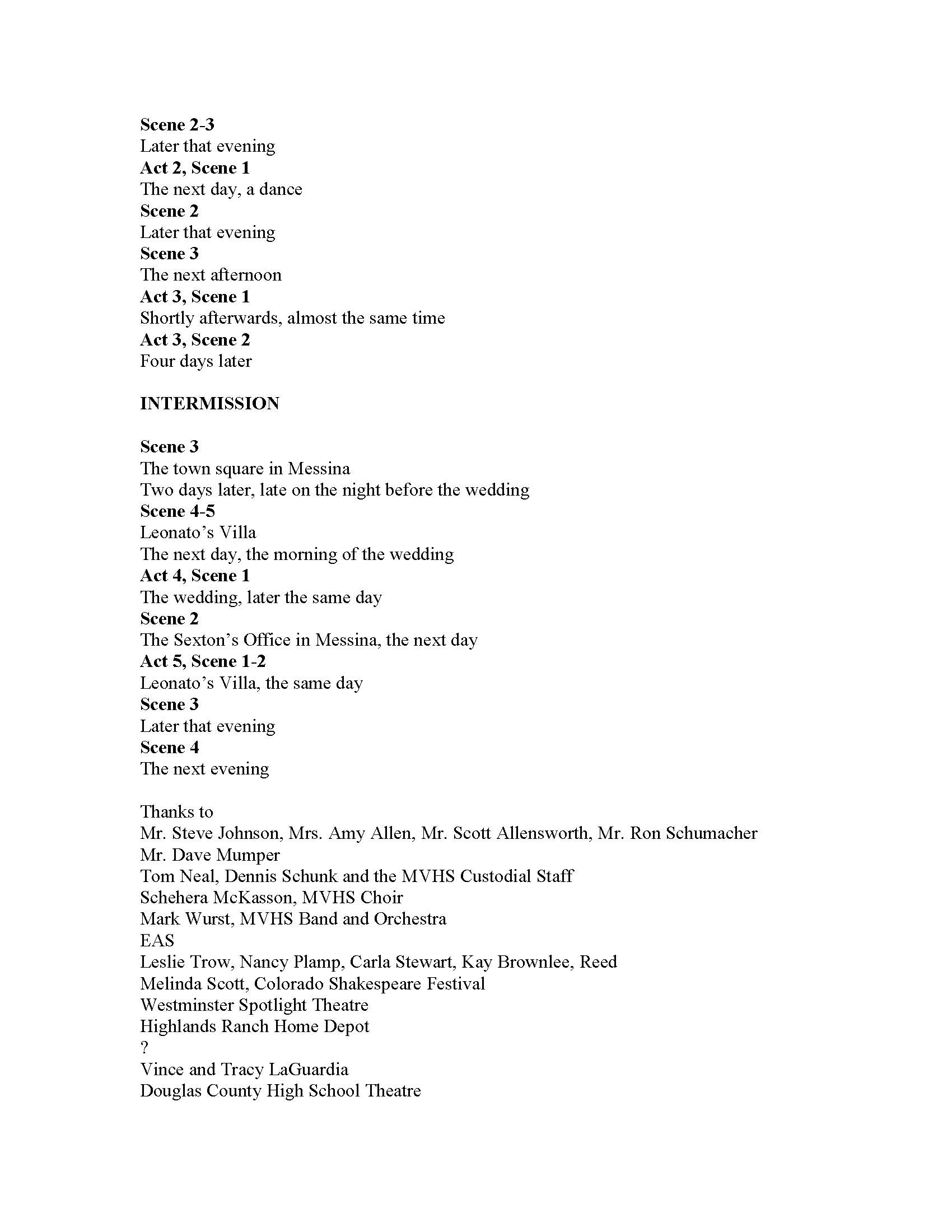Much Ado About Nothing
Focus/reading questions
Note: All acts, scenes, and lines and are noted 1.1.32-45 with the first number being the act, the second number the scene, and the final numbers the lines which are also noted in the script.
- Overall, the play is written with tons of linguistic playfulness. READ PAGES xxi-xxiv IN THE FOREWARD to get an excellent idea of what sort of tricks and wits Shakespeare uses in this play. Watch for puns, double entendres, misplaced meanings, and other instances where the characters use words intentionally in ways that are unexpected. One example is in 2.3.54-62 where Balthasar and Don Pedro question musical quality and the importance of speaking at all. Another different example, where a character uses colorful and vibrant language to prove a point, is 2.1.21-80, where Beatrice employs numerous similes, metaphors, and flourishes. In general, Benedick and Beatrice are excellent wordsmiths, and they know it, so pay particular attention to their scenes. Pick at least two more examples of linguistic playfulness.
- What is Shakespeare’s opinion of women in general? How does he expect them to behave in public?
- The entire plot turns on misunderstandings and understandings. Every significant event, from Beatrice and Benedick’s “courting,” to Claudio’s dismissal of Hero, to the ineffective watch accidentally catching Borachio and Conrade, is a direct result of someone or more than one person misinterpreting or misunderstanding words or actions.
Think of an experience that you have had where you have misunderstood or misapprehended a something that has been told to you. Describe this experience.
- How powerful is hearsay in this play, and in your life in general?
- The play also explores to a large degree the theme of deception by appearances, with the scenes with masked characters, especially Hero at the end, significant to themselves. Are people easily deceived by appearances?
- Benedick and Beatrice have to learn to “suffer love.” How much do these characters deceive, or misplace, themselves?
- What is Shakespeare’s opinion, in this play, of people’s ability to communicate with each other?
- Harold Bloom, one of the most important Shakespeare scholars in the world, wrote about Much Ado About Nothing that it is “Certainly the most amiably nihilistic play ever written.” Nihilism is defined as “1) the general rejection of established social conventions and beliefs, especially of morality and religion 2) a belief that life is pointless and human values are worthless 3) the belief that there is no objective basis for truth.” Do you agree or disagree? Pick some examples in the play supporting your opinion.
- Beatrice and Benedick have been lovers before and, for reasons unknown, they chose not to continue the relationship. It can be argued that her vitality, however expressed <wink> has frightened him into flight and made him wary of women in general. Can you find evidence in the text or the characters’ behaviors to support this theory?
- How do Beatrice and Benedick think that they are different from other men and women?
- What is the thematic function (purpose) of the Dogberry/Verges/Watch subplot?
- Look at Benedick’s monologue on page 77, lines 223-248. What generalizations is he making about the human race and what decisions is he coming to in this speech? Also, judge the relative truth of this statement: this monologue is the central moment/speech of the play.
- How would you stage Claudio’s dismissal of Hero in 4.1? How would you build the scene to a climax knowing what Claudio will do?
- What is Shakespeare’s opinion of the judgment of authority figures, specifically Leonato, Dogberry, and Don Pedro in this play?
- It is often said in acting that in every scene there is a winner and a loser, that every dialogue is a contest where the points can be scored by the success or failure of the tactic, the quality of the next choice, and the final outcome of the scene. In this play, this idea is particularly important, since the main characters think (and behave) as if conversation is an art form and a game. With this in mind, pick the winner and support your decision in the following exchanges:
1.1.111-143
1.1.220-283
2.1.25-81
2.3.249-258
5.4.74-102



